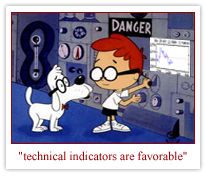
|
The efficient market hypothesis is, above all else,
convenient. From a distance, it at once explains the overall behavior
of equities markets, relieves the layperson of any obligation to
become a student of finance, and provides the basis for the index
fund, a fine financial instrument for the casual investor if there
ever was one. But upon further inspection, strong-form EMH is
desolate; it promises that you cannot do better no matter how hard you
try. It is arrogant in its explanation of why one person does better
than another person -- the explanation is always luck and in the long
run you'll both end up in the same place.
|
Thus, the hopeful water down the strong-form efficient market
hypothesis. Weak-form EMH allows for equities to be improperly
assessed and priced by the market and the shrewd investor can thus
produce excess returns. It's a rosier picture of the financial world,
and one that suggests he who thinks the hardest can become the King of
Investors.
What would the King of Investors look like? Would it be one guy
with a really huge brain? Would it be a team of well-trained analysts?
Would it be the guy on the Investools commercial who just told you he
can make money in any market, whether it's going up, down, or
sideways? Given the mass of stocks (there are thousands) and the
considerable volume of data that comes with each stock, you can bet
that the King of Investors will be a computer-aided endeavor, though
Investools probably will not be involved.
The limits to what a computer and some good software can do are
relatively unknown at this point. Much of the work in computational
finance is inherently flawed -- preoccupied with technical analysis or
conducted by teams lacking in one of the necessary disciplines
(finance, information technology, statistics). Precious little
unleashes the full brunt of the computer science arsenal (information
retrieval, data mining, machine learning, etc) on the problem.
My goal is to seek the boundaries of the efficient market
hypothesis. I'd tell you all about it but I do believe in weak-form
EMH.
- Victor Lavrenko, Matthew D. Schmill, Dawn
Lawrie, Paul Ogilvie, David Jensen and James Allan. "Language Models
for Financial News Recommendation," In Proceedings of the Ninth
International Conference on Information and Knowledge Management
CIKM, Washington, DC November 6-11, 2000.
-
Victor Lavrenko, Matthew D. Schmill, Dawn Lawrie, Paul Ogilvie, David
Jensen and James Allan. "Mining of Concurent Text and Time Series". In
Proceedings of the Sixth ACM SIGKDD International Conference on
Knowledge Discovery and Data Mining, pp. 37-44, 2000.
|







